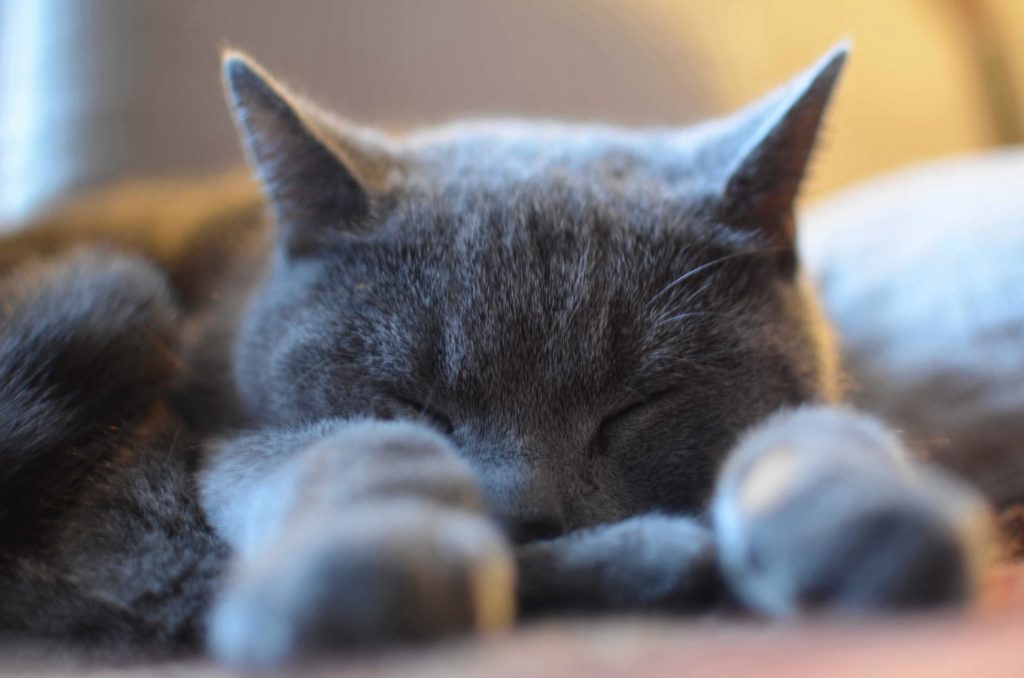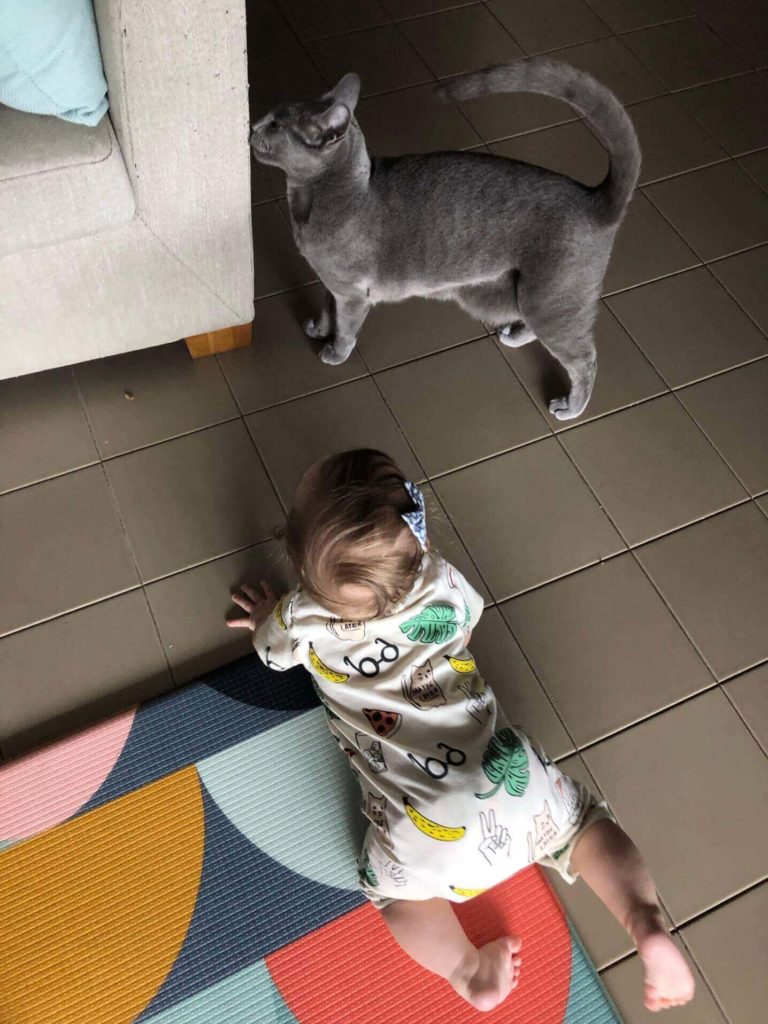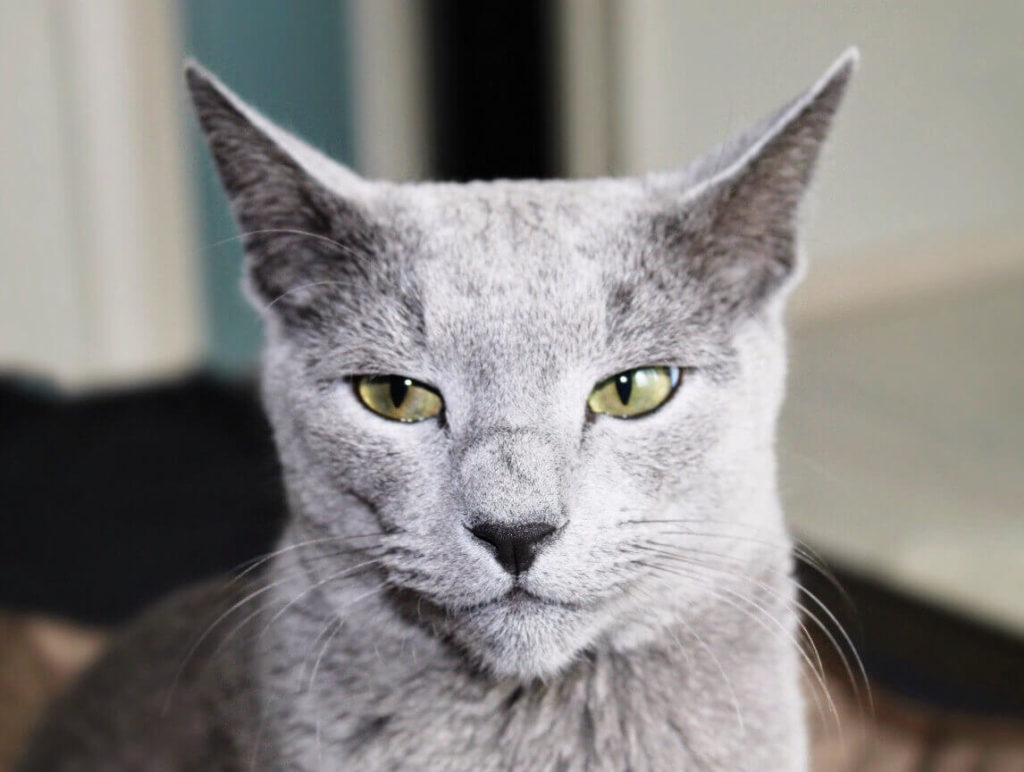With dazzling green eyes and shimmering, silvery bluish-gray coat, Russian Blue Cats are without a doubt one of the most attractive breeds in the world. If you’re considering bringing a Russian Blue cat into your life, or if you already have one, you might be wondering about their lifespan. After all, pets are important members of our families and we want them to be with us for as long as possible. So, how long do Russian Blue cats live?
On average, Russian Blue cats live for 15-20 years. However, some have been known to live longer, with a few reaching up to 25 years of age. With proper care and attention, they can live beyond this range. It’s important to note that a cat’s lifespan depends on various factors such as genetics, environment, and lifestyle. If you can help your Russian Blue get regular check-ups, a balanced diet, a stress-free and safe home, you can help increase their lifespan.
How Long Do Russian Blue Cats Live?
Russian Blue Cats have an average lifespan of 12-20 years, with some living to be 20 years old or more. This is longer than the average lifespan of general domestic cats, which is 11-17 years. With proper care, some Russian Blues have even lived to be 25 years old. While individual Russian Blues may live for varying lengths of time, on average they live significantly longer than other domestic cats.
If you’re considering adopting a Russian Blue, remember that to ensure your cat lives a long, healthy, and happy life, you need to provide proper care and nutrition throughout its lifetime, from playful kitten to senior cat. This includes regular vet check-ups, providing a balanced diet, and plenty of love and attention. For more detailed information on how to care for your Russian Blue, check out our guide on caring for a Russian Blue cat.
How Long Can An Indoor Russian Blue Cat Live For?
An indoor Russian Blue cat can live up to 15-20 years, with some even living beyond the age of 20 years. Compared to outdoor cats, indoor Russian Blues have a higher life expectancy due to the reduced exposure to environmental risks such as traffic accidents, predation, and diseases. As indoor cats, they are not exposed to the same risks as outdoor cats and are more likely to receive preventative healthcare and a balanced diet that helps to maintain their health and longevity.
It’s important to note that providing a stimulating and enriched environment is also crucial for the well-being of indoor cats. This includes providing toys, scratching posts, and climbing structures to prevent boredom and promote exercise.
How Long Can An Outdoor Russian Blue Cat Live For?
An outdoor Russian Blue cat can live for an average of 7-12 years. Outdoor cats face numerous environmental risks that indoor cats do not, including exposure to traffic, predators, and disease. They are also more likely to get into fights with other animals, which can lead to injuries or infections.
While some outdoor cats may live longer, their lifespan is typically shorter than indoor cats. However, there are steps that can be taken to help outdoor cats live longer, such as providing a safe and secure outdoor enclosure or supervising their outdoor time. Regular visits to the veterinarian for preventative care, such as vaccinations and parasite control, can also help to maintain their health and prolong their life.
Factors That Affect The Lifespan Of A Russian Blue Cat
Cats may not really have nine lives, but factors such as genetics, nutrition, exercise, healthcare, and environment can have an impact on how long a Russian Blue cat can live.
Genetics
Genetics play a significant role in the lifespan of a Russian Blue cat. Genetics determine not only physical characteristics but also can affect the cat’s health and susceptibility to diseases. Some genetic conditions may be inherited, such as hypertrophic cardiomyopathy, a common heart condition that affects the breed. A cat with a family history of this condition is at a higher risk of developing it. This condition can affect the cat’s lifespan if left untreated.
Therefore, when considering adopting a Russian Blue kitten, it’s important to choose a reputable breeder who can provide you with information on the cat’s family history. A good breeder should be able to provide information on the cat’s lineage, including any known health issues in the family tree. Additionally, a reputable breeder should conduct health screenings and genetic testing on their breeding cats to ensure they are healthy and not carrying any genetic conditions.
By choosing a good breeder, you can help reduce the risk of adopting a Russian Blue cat with genetic health issues and increase their chances of living a long and healthy life. Ultimately, genetics can impact a Russian Blue cat’s lifespan, but by making informed choices, you can help ensure your feline companion lives a long and healthy life.
Nutrition
Nutrition is an important factor that can impact the lifespan of a Russian Blue cat. A well-balanced diet plays a crucial role in keeping the cat healthy and free of diseases. Feeding a diet that is lacking in essential nutrients or is high in calories can lead to obesity, which in turn can cause several health problems, such as heart disease, diabetes, and joint problems. Moreover, obesity can shorten the cat’s lifespan by several years. Therefore, it’s crucial to have a proper diet plan for Russian Blue cats.
To provide a good diet for a Russian Blue cat, one should choose a high-quality cat food that is rich in protein, vitamins, and minerals. Dry or wet cat food formulated for a cat’s age and activity level is recommended. It’s important to read the ingredients list and avoid food that contains fillers or artificial preservatives. Additionally, supplements such as probiotics, fatty acids, and vitamins can be added to the cat’s diet to ensure optimal health.
A balanced diet for a Russian Blue cat should include a combination of protein, fat, and carbohydrates. A high-quality protein source like chicken, fish, or turkey should make up the majority of the diet. Fats provide energy and support healthy skin and coat, while carbohydrates provide fiber and energy. It’s also important to provide fresh, clean water at all times to ensure proper hydration. By providing a healthy and balanced diet plan for Russian Blue cats, their lifespan can be extended, and they can live a healthy and happy life.
Exercise
Regular exercise is an important factor that can impact the lifespan of a Russian Blue cat. Just like humans, a sedentary lifestyle can lead to obesity and other health problems in cats, which can ultimately shorten their lifespan. Providing regular exercise for your Russian Blue can help them maintain a healthy weight, improve cardiovascular health, and reduce the risk of developing chronic diseases such as diabetes and arthritis.
To provide good exercise for your Russian Blue, it’s important to create a play routine that stimulates their natural instincts, such as hunting and chasing. This can include interactive toys such as wand toys or laser pointers, scratching posts, and puzzle feeders. Playing with your Russian Blue regularly, ideally for at least 20-30 minutes a day, can help keep them physically and mentally stimulated.
In addition to structured playtime, there are also things you can do at home to encourage your cat to be more active. This includes providing vertical spaces for them to climb, such as cat trees or shelves, and hiding treats or toys around the house to encourage them to explore.
There are also various cat products that can help your Russian Blue exercise, such as cat wheels and tunnels. These products can provide a fun and safe way for your cat to burn off energy and stay active.
Overall, providing regular exercise and playtime for your Russian Blue can help ensure they live a long and healthy life. Just remember to always supervise playtime and consult with your veterinarian if you have any concerns about your cat’s exercise routine.
Health Issue
The health of a Russian Blue cat is a critical factor that affects their lifespan. Unfortunately, inherited health problems can be a significant issue for this breed, and buying from reputable breeders is essential to minimize the risk. Common health concerns of Russian Blue Cat include hypertrophic cardiomyopathy, urinary tract issues, and gum disease. If these issues are left untreated, they can lead to a shortened lifespan.
However, proper healthcare can significantly improve the lifespan of a Russian Blue cat. Regular check-ups with a veterinarian can help detect health problems early on, allowing for prompt treatment. In addition to wellness exams, ensuring that your Russian Blue receives a balanced diet, plenty of exercise, and regular grooming can all contribute to their overall health and lifespan.
It’s essential to keep a close eye on your Russian Blue and take note of any changes in behavior or physical appearance, as they may indicate an underlying health issue. By providing proper healthcare and promptly addressing any health concerns, you can help your Russian Blue live a long and healthy life.
Can Dental Health Affect The Lifespan Of A Russian Blue Cat?
Dental health is an important aspect of overall health and can impact the lifespan of a Russian Blue cat. Poor dental hygiene can lead to a variety of health problems, including gum disease, tooth decay, and bacterial infections. These conditions can cause pain, difficulty eating, and other health problems that can reduce a cat’s quality of life and potentially shorten their lifespan. This is the reason why you should have your Russian Blue teeth cleaned.
It’s important to keep an eye on your Russian Blue’s dental health and look for signs of problems, such as bad breath, swollen gums, or difficulty eating. A Russian Blue cat won’t always let you know when they’re in pain, but you’ll be able to determine if they’re having problems based on their behavior.
Research has shown that cats that ate dry food had fewer dental issues than cats who ate wet food. However, it’s important to note that dry food may not be the ideal choice for a cat’s optimal health in terms of nutrition and hydration. It’s best to discuss your cat’s dental health with your veterinarian and develop a dental care plan that includes regular teeth cleanings and a balanced diet that meets their nutritional needs. Proper dental care can help ensure a long and healthy life for your Russian Blue cat.
What Can You Do To Ensure Your Russian Blue Cat Lives Longer?
To ensure your Russian Blue cat lives a long and healthy life, there are several things you can do. Firstly, providing your cat with proper nutrition and a well-balanced diet is essential. A diet that is high in protein, vitamins, and minerals can help prevent diseases and keep your cat in good health. It’s also important to avoid overfeeding your cat, as obesity can lead to several health problems and shorten their lifespan.
In addition to proper nutrition, regular exercise is also crucial for a Russian Blue cat’s health. Playtime and daily activities can help your cat maintain a healthy weight, improve their cardiovascular health, and prevent joint problems. Environmental enrichment, such as providing scratching posts, toys, and hiding places, can also keep your cat mentally stimulated and improve their overall well-being.
Another factor that can impact your Russian Blue cat’s lifespan is regular veterinary care. Routine check-ups and wellness exams can detect and treat illnesses and diseases early, increasing the chances of a longer and healthier life. Dental care is also important, as dental problems can lead to systemic health issues that can affect your cat’s lifespan.
Finally, giving your Russian Blue cat plenty of love and attention is essential for their happiness and well-being. A strong bond with their owner can help reduce stress, prevent behavioral problems, and improve overall quality of life. By following these tips, you can help ensure your Russian Blue cat lives a long and happy life.
How Can Spay Or Neuter Russian Blue Increase Lifespan?
According to the American Veterinary Medical Association, spaying or neutering your Russian Blue cat can help increase their lifespan. A study conducted by Banfield Pet Hospitals on a database of 2.2 million dogs and 460,000 cats reflected similar findings, concluding that neutered male dogs lived 18% longer and spayed female dogs lived 23% longer. Spayed female cats in the study lived 39% longer and neutered male cats lived 62% longer. The reduced lifespan of unaltered pets can be attributed to an increased urge to roam, exposing them to fights with other animals, resulting in injuries, infections, trauma from vehicle strikes, and other accidental mishaps.
In addition, intact female cats and dogs have a greater chance of developing pyometra (a potentially fatal uterine infection) and uterine, mammary gland, and other cancers of the reproductive system. Neutering male pets eliminates their risk of testicular cancer and eliminates the possibility of developing benign prostatic hyperplasia, which can affect the ability to defecate.
If you’re considering spaying or neutering your Russian Blue cat, it’s important to discuss the procedure with your veterinarian to determine the best age and timing for the surgery. The American Veterinary Medical Association recommends spaying or neutering cats between 4-6 months of age. To learn more about the benefits of spaying and neutering your pet, check out this research paper by the Humane Society of the United States.
Conclusion
In conclusion, Russian Blue cats have a lifespan of 15-20 years, with some even living beyond 20 years if they receive proper care and attention. While genetics play a significant role in determining their lifespan, factors such as nutrition, exercise, and healthcare can also have a significant impact.
As with any pet, it’s essential to provide the best possible care to ensure they live a long and healthy life. Regular veterinary check-ups, a balanced diet, exercise, and plenty of love and attention can help extend the life of your Russian Blue. With their charming personality, stunning looks, and long lifespan, Russian Blues make great companions for anyone looking for a loyal feline friend.





